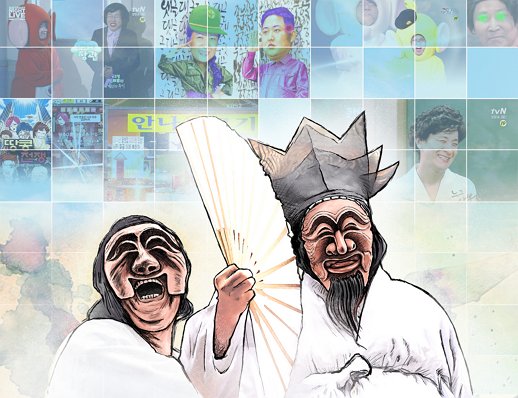[Weekender] The embattled state of satire
The ‘powerless’ across the globe in all ages have developed satire independently, and Korea is no exception.
By Korea HeraldPublished : Feb. 27, 2015 - 21:14
From Aristophanes of ancient Greece to the editorial staff of Charlie Hebdo, satirists and their trade have been an influential part of society throughout history.
The genre has existed even before literacy was a factor in our lives. In the words of British actor and comedian David Walliams, “Social satire has been around since people have been around.”
U.S. journalist Molly Ivins described satire as “the weapon of the powerless against the powerful.”
As such, the “powerless” across the globe in all ages have developed satire independently, and Korea is no exception.
Using culture to satirize those with wealth and power, the criticism of whom was out of reach of the common people, was a key part of entertainment for centuries.
During the Joseon era, mask dances that satirized the ruling classes and the wrongdoings of people from all walks of life became popular.
The genre has existed even before literacy was a factor in our lives. In the words of British actor and comedian David Walliams, “Social satire has been around since people have been around.”
U.S. journalist Molly Ivins described satire as “the weapon of the powerless against the powerful.”
As such, the “powerless” across the globe in all ages have developed satire independently, and Korea is no exception.
Using culture to satirize those with wealth and power, the criticism of whom was out of reach of the common people, was a key part of entertainment for centuries.
During the Joseon era, mask dances that satirized the ruling classes and the wrongdoings of people from all walks of life became popular.

Mask dances became fixtures in local communities, and the performances took on flavors specific to different regions and evolved into distinct versions.
Mocking those who lived above the rules governing ordinary people can also be seen in the literature of the Joseon era, when in general only the upper classes could read.
One of the more famous literary examples of Korean satire is “Yangbanjeon” by Park Ji-won, an 18th century scholar and writer.
The book tells the story of a rich commoner who buys a title from an impoverished aristocrat, or “yangban.”
In the story, the commoner wished to buy the apparent grace and dignity that the title would bring. However, the author exposes the hypocritical and tyrannical habits of many aristocrats of the time through a contract drawn up by the chief of the local government.
The commoner then calls off the deal saying that the contract would turn him into a robber.
The story also satirizes the change of status that people of that time were undergoing.
In more recent years, however, satire or any form of expression that could potentially depict the authorities in a disrespectful light was strongly oppressed.
Dictators who took and held on to power through force and rigged elections approached the issue with singular harshness.
At times, military dictators’ oppression of satire extended to extreme, even absurd levels.
For almost four years, late television actor Park Yong-sik was banned from television because of his striking resemblance to Chun Doo-hwan, the disgraced president who held office between 1981 and 1988.
During that time, the Chun administration is said to have even gone so far as to prevent fictional characters with menial jobs from being called “Soon-ja,” a name shared by Chun’s wife.
With political figures out of bounds, the rich became a target of mockery, with state-run KBS broadcasting a segment of a comedy program that depicted a company’s board of directors as a group of incompetent old men.
While freedom of expression has improved greatly since the days of military dictators, the president remains largely off-limits for would-be satirists.
In 2010, university lecturer Park Jeong-su enraged the authorities with the so-called “rat poster.” At the time, Park was apprehended for painting the image of a rat, the animal former President Lee Myung-bak was mockingly compared to, on a poster publicizing the G20 summit in Seoul.
While he avoided jail, he was fined 2 million won ($1,800), with the court ruling that the academic and artistic freedom guaranteed by the Constitution was “not an unlimited fundamental right.”
While such cases display Korea’s still-conservative approach to satire and stylized mocking of the powers that be, oppressing the desire to satirize is likely to become an increasingly difficult, if not impossible task.
Perhaps more than others, Koreans have embraced the anonymity and rapidity offered by digital and telecommunications technologies.
It is now seemingly impossible for today’s politicians to keep their follies hidden, and the public has shown themselves to be adept parodists and satirists.
This week, we take a closer look at the state of satire in Korea and abroad.
By Choi He-suk
(cheesuk@heraldcorp.com)
-
Articles by Korea Herald



![[Exclusive] Korean military set to ban iPhones over 'security' concerns](http://res.heraldm.com/phpwas/restmb_idxmake.php?idx=644&simg=/content/image/2024/04/23/20240423050599_0.jpg&u=20240423183955)

![[Graphic News] 77% of young Koreans still financially dependent](http://res.heraldm.com/phpwas/restmb_idxmake.php?idx=644&simg=/content/image/2024/04/22/20240422050762_0.gif&u=)



![[Pressure points] Leggings in public: Fashion statement or social faux pas?](http://res.heraldm.com/phpwas/restmb_idxmake.php?idx=644&simg=/content/image/2024/04/23/20240423050669_0.jpg&u=)










